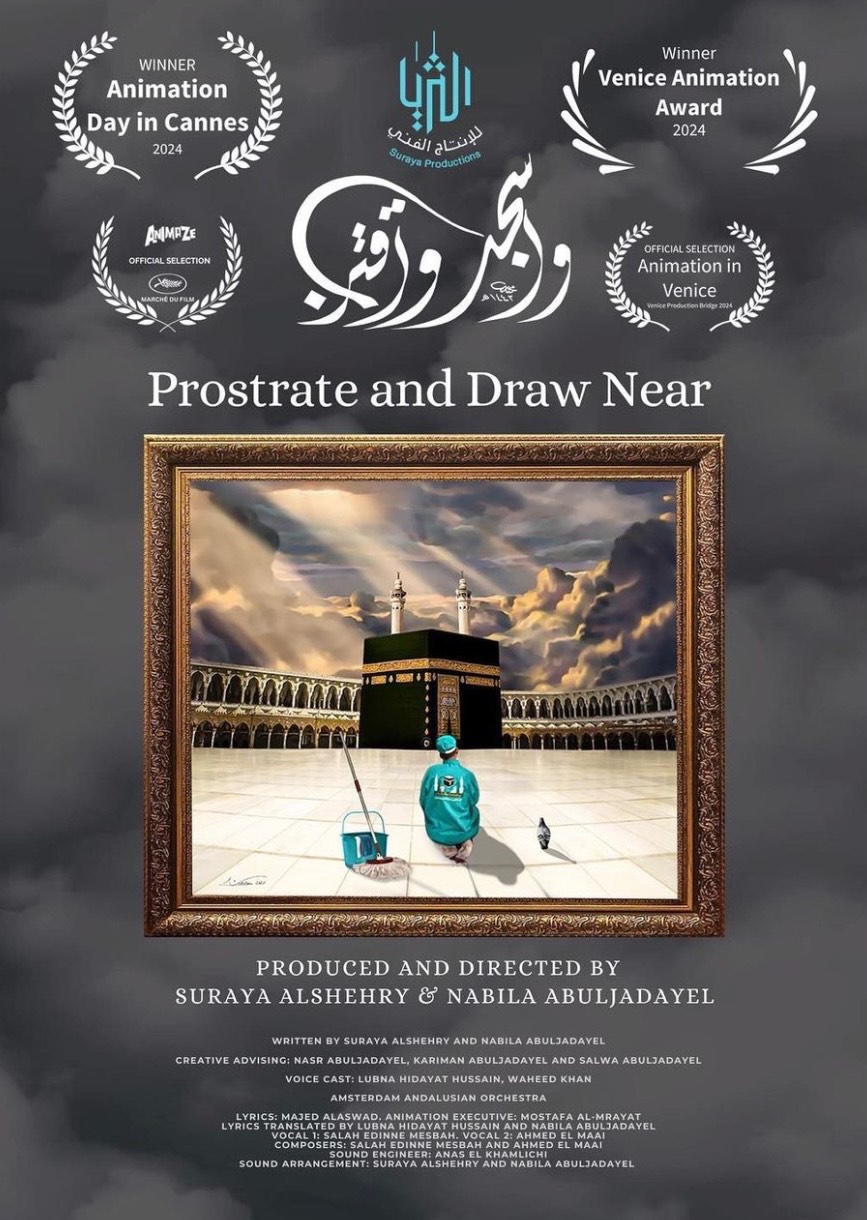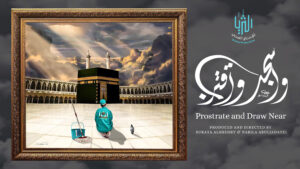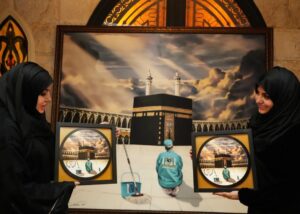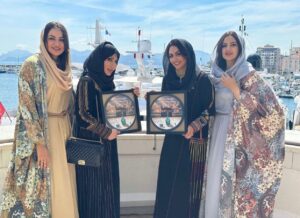
Oscar Qualifying Short Film Review “Prostrate And Draw Near”
NO TRAILER CURRENTLY AVAILABLE
First, the Recap:
The maintaining of faith. It becomes one of those elements in life we might actually take for granted. Our belief in that which we pursue alone occupies much of our mind’s time and effort. Wes drive towards all we wish to accomplish, ideally finding it, and experiencing the triumphs it offers. However, when in the context of our personally chosen religion, do we not sometimes see that deep devotion might not be as strong as we thought?
The drastic impact of COVID-19 is in its height, and the ongoing necessity to remain away from others and inside is imperative but sorrowful. In Saudi Arabia, the revered courtyard of the Masjid al-Haram stands barren, devoid of the usual vibrant life its worshippers bring. But, in the eerie silence, a lonely cleaner (Waheed Khan) goes about his duties, then pauses to soak in the opportunity to re-visit his faith in an entirely new manner.
Next, my Mind:
No one is going to forget the year 2020 and the global epidemic called COVID-19 that was to forever define it. With the lives of so many drastically impacted, even to the point of those who tragically passed away in its malignant, constantly evolving wake, nothing would be the same again. With such a kaleidoscope of facets to our existence that it interrupted, the aspect of forced isolation was one of the hardest, mentally and spiritually taxing decisions made. The ripple effect, the distressing weight placed on human hearts, minds, and souls, was legion. It is one of these perspectives that acts as the core for this six minute forty-two second, Oscar qualifying, DEBUT short film from Saudi Arabian mother/daughter writing/directing/producing duo Suraya AlShehry and Nabila Abuljadayel.
Its potent reminder of COVID-19’s collision with one of the world’s most recognizable religions is stirring and persuasive, with a message meant for ALL. Finding equal ground by being both beautifully inspiring while likewise eliciting an unavoidably compelling conviction in your spirit, the narrative conveying the viewpoint (and subsequent reflection on faith’s meaning) of a lonely cleaner who is one of the only individuals allowed to be inside the now-surreally, hauntingly unoccupied courtyards of the Grand Mosque in Mecca carries with it a depth and magnitude of foundational humanity and the anatomy of personal belief which transcends its direct portrayal of the Muslim faith that serves as the film’s cornerstone. The understated yet evident degrees of how we as people sometimes lose our way when it comes to such elements as prayer AND firm, unshakable veneration for both God and every person alive on the Earth is tangibly affecting here.
THIS is where the approach the film takes, the artistically creative means by which those latter points are made, cements in your mind the sheer significance, the importance, the NECESSITY of us as people inhabiting and sharing this world to at least be in fundamental harmony, respect, and unity instead of being so overtly polarized based on factors that, yes, we might not always agree with, but yet shouldn’t allow to separate us from just BEING human towards one another. Implemented and enforced solitude, plus the accompanying detachment from others, that COVID-19 brought about birthed a whole new level of mental stress and anguish. To see this portrayed through the eyes of one man encountering said actualities in a unique, overwhelming way just lends a highly distinctive, evocative atmosphere to the film. It is requisite that we are aware of all of this encompassing message, and how we need to move forward.
Additionally, the imagery of the dove as a symbol of devotion and faith is present, and it manifests as a catalyst for the cleaner’s encounter with God and his own perceived lack of devotion he’s now amending. His reminiscing of how things were at the Grand Mosque prior to COVID-19 also places an impactful layer to the grander foray into commitment and adoration for God and His ways to follow. The film’s finale forms an ultimate picture of humbled worship, an amazingly profound instance of touching, redemptive strength and, perhaps, individual deliverance in the midst of a place that would normally be alive with thousands honoring their own faith. That prompting, even admonition, to re-discover belief, then observe what the project’s title clearly states–be prostrate and draw near–so our viewpoints would be awoken anew is an integral thematic gist we need to heed and, this critic genuinely hopes through this film, nurture.
Based on original artwork done by the film’s director Nabila Abuljadayel, the imagery here heralds back once more to the days of hand-drawn animation, which I feel works SO well here, as it aids in presenting the starker reality of the film’s narrative while paying homage to the talent of the artist behind it. Plus, it’s the dynamic eloquence of simplicity it represents that also pairs deftly with the principals being explored here, and I know I am truly starting to miss the times of this type of stylistic visual exhibition, making this film fresh in the day an age of CGI. Also, there are major benchmarks being brought about by this film. It is the FIRST Saudi animated short film to be in consideration for an Oscar AND the FIRST time Saudi female animation directors/producers have made it to this stage. It is already a historical moment for Saudi cinema, and advancing to the short list, much less nomination, would be an even larger achievement to add to it.
The other primary component to the film that warrant attention are the utterly poignant, indelible, and ethereally emotive adhan vocalizations that make up the call to fealty and adherence to prayer and passion for God throughout the film’s abbreviated runtime. With lyrical content provided by Majed Alaswad, music from the Amsterdam Andalusian Orchestra, and vocalizations by well-established composers Salah Eddine Mesbah and Ahmed ElMaai, you as a viewer cannot help but be swept up in the sonic tapestry of it all, the compositions becoming characters in and of themselves even as we witness the tale of situational remembrance, sense of loss, and that which is now being regained. As stated earlier in the review, this can all be SO appreciated and grasped regardless of where your own beliefs lie, as it is a universal call to ALL people to come to faith, or perhaps embark on a newly found path to seek it for the first time.
The only actors present for this film are, as expected, via voice only through Luba Hidayat Hussain and Waheed Khan along with recorded news from a Saudi news channel. So, in total, “Prostrate And Draw Near” offers a worldwide rallying cry to not just those of the Muslim faith, but to each and every human soul, that we remember the impact of a global event, its consequences, and the changes it made to the face of our existence. But, may it then be the rousing encouragement to know faith, to believe in something higher than ourselves, to embrace humbleness, to be devoted to helping our fellow human beings, and hence learn to live TOGETHER with the abiding love, peace, support, and mutually shared respect this world so desperately requires. It’s possible, but WE must make the choice. May God bless this place we call home and all hearts who reside within it.
STAR RATING (out of 5):
As always, this is all for your consideration and comment. Until next time, thank you for reading!





